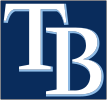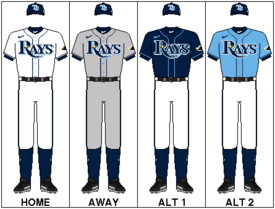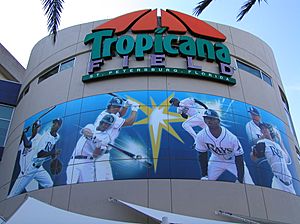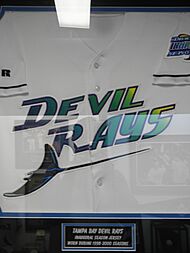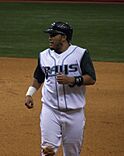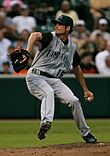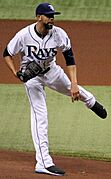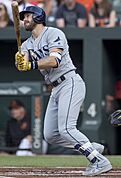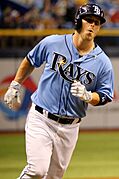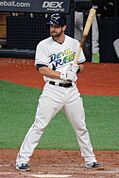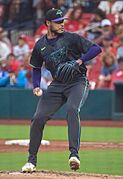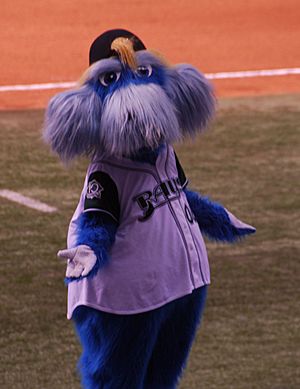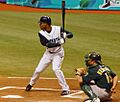Tampa Bay Rays facts for kids
Quick facts for kids Tampa Bay Rays |
|||||
|---|---|---|---|---|---|
|
|||||
|
|||||
| Major league affiliations | |||||
|
|||||
| Current uniform | |||||
| Retired numbers | |||||
| Colors | |||||
|
|||||
| Name | |||||
|
|||||
| Ballpark | |||||
|
|||||
| Major league titles | |||||
| World Series titles (0) | None | ||||
| AL Pennants (2) |
|
||||
| AL East Division titles (4) |
|
||||
| Wild card berths (5) |
|
||||
| Front office | |||||
| Principal owner(s) | Stuart Sternberg | ||||
| President | Brian Auld Matt Silverman |
||||
| President of baseball operations | Erik Neander | ||||
| Manager | Kevin Cash | ||||
The Tampa Bay Rays are a professional baseball team from the Tampa Bay area in Florida. They play in Major League Baseball (MLB) as part of the American League (AL) East Division. The Rays are one of two MLB teams in Florida, the other being the Miami Marlins.
The team played its home games at Tropicana Field until 2024. For the 2025 season, the Rays are playing at George M. Steinbrenner Field in Tampa, Florida. This change happened because Tropicana Field was damaged by Hurricane Milton in October 2024.
The team started playing in the 1998 Major League Baseball season as the Tampa Bay Devil Rays. This happened after many years of trying to bring a baseball team to the area. An ownership group led by Vince Naimoli was approved in 1995.
For their first ten years, the team struggled and often finished in last place. After the 2007 season, Stuart Sternberg, who became the main owner, changed the team's name from "Devil Rays" to "Rays." The new name refers to both manta rays and rays of sunshine. A manta ray logo is on the uniform sleeves, and a sunburst is on the front.
The 2008 season was a big turning point. The Rays had their first winning season, won their division, and won the American League pennant. They beat the Boston Red Sox in the ALCS but lost to the Philadelphia Phillies in the World Series. Since then, the Rays have made it to the postseason eight more times. They won the American League pennant again in 2020 but lost to the Los Angeles Dodgers in the World Series. The Rays are one of five MLB teams that have not yet won a World Series title.
The Tampa Bay Rays have strong rivalries with the Boston Red Sox and the New York Yankees, who are also in the AL East. They also have a rivalry with the Miami Marlins, another Florida team.
Through the 2024 season, the Rays' overall record is 2,091 wins and 2,179 losses.
Contents
Team History
Starting the Team
The Tampa Bay area has a long history with baseball. Major League Baseball teams held spring training there starting in the 1910s. Minor league teams also played in the area. After World War II, the region grew, and people started thinking about bringing a major professional sports team there.
Efforts to bring a major league baseball team to Tampa Bay began in the late 1960s. Many teams, like the Oakland Athletics and Minnesota Twins, thought about moving to Tampa or St. Petersburg. To attract a team, the city of St. Petersburg built the Florida Suncoast Dome (now Tropicana Field) in the mid-1980s. It opened in 1990, ready for a team.
When MLB planned to add two new teams for the 1993 season, many thought one would go to Tampa Bay. However, the league chose Denver (the Colorado Rockies) and Miami (the Florida Marlins) instead.
Finally, on March 9, 1995, MLB gave an expansion team to an ownership group led by Vince Naimoli. This happened partly to settle a lawsuit Naimoli had against MLB. The new team would play at Tropicana Field starting in the 1998 season.
Naimoli first wanted to name the team the "Tampa Bay Sting Rays." But another team already had that name. So, Naimoli chose "Tampa Bay Devil Rays" instead. Some people did not like the word "devil," but fans approved the name in a poll.
The Tampa Bay Devil Rays hired Chuck LaMar as their first general manager and Larry Rothschild as their first manager in 1997. In the Expansion Draft, they picked players like Tony Saunders and Bobby Abreu. They also got veteran stars like Fred McGriff and Wade Boggs, who are now in the Baseball Hall of Fame.
Early Years and Challenges (1998–2005)
The Devil Rays played their first game on March 31, 1998, at Tropicana Field. They lost 11–6 to the Detroit Tigers. The next day, they won their first game, beating Detroit 11–8. Even though they started well, the team lost 99 games that year.
The Devil Rays continued to struggle for several seasons. Many of their older star players were past their best. Wade Boggs did make history by hitting his 3000th career hit, a home run, in 1999. Manager Rothschild was fired in 2001 and replaced by Hal McRae. The team had its worst record in 2002, losing 106 games. However, new players like Carl Crawford started to shine.
Lou Piniella, a Tampa native, became manager for the 2003 season. In 2004, the Devil Rays finished 4th in their division, the first time they were not in last place. Carl Crawford became a star, leading the American League in triples and stolen bases. Despite some good players, the team still did not have much fan support.
After the 2005 season, the new owner, Stuart Sternberg, bought out Piniella's contract. Sternberg was ready to make big changes.
The Rays and First Playoff Runs (2006–2015)
For the 2006 season, Sternberg hired Joe Maddon as manager. He also hired Andrew Friedman to lead the baseball operations. The team still struggled in 2006 and 2007.
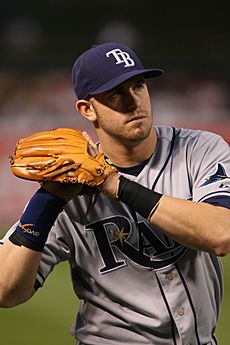
Before the 2008 season, the team changed its name to the Tampa Bay Rays. They dropped "Devil" and changed their colors to navy, light blue, and gold. Sternberg increased the team's budget. New players like Matt Garza, David Price, Ben Zobrist, and Evan Longoria joined the team.
The Rays started the 2008 season very strong. They became the first team since 1900 to have the best record in the league after having the worst record the year before. They made the playoffs for the first time on September 20. The Rays ended up winning their division, the AL East.
In the playoffs, the Rays beat the Chicago White Sox and then the Boston Red Sox to reach the World Series. It was their first time in the World Series, but they lost to the Philadelphia Phillies.
The Rays continued to have winning seasons. In 2010, Matt Garza threw the team's first no-hitter. They won the AL East again but lost in the playoffs. In 2011, they made the playoffs as a wild card team, beating the Red Sox in a dramatic final game. They lost in the playoffs again.
In 2012, David Price became the first Rays pitcher to win the Cy Young Award, given to the best pitcher. The team returned to the playoffs in 2013 but lost to the Red Sox.
After 2013, the team had a losing record in 2014. General Manager Andrew Friedman left, and manager Joe Maddon also decided to leave. Maddon had led the team to 754 wins and 705 losses.
The Kevin Cash Era (2015–Present)
The Rays named Kevin Cash as their new manager on December 5, 2014. He was the youngest manager in the league. In 2015, players like Chris Archer and Kevin Kiermaier played well, but the team had a losing record. The next year was even tougher, with many injuries.
In 2017, Erik Neander took over as general manager. He continued the Rays' strategy of making smart trades. Before 2018, the Rays traded away star player Evan Longoria. They also traded pitchers like Jake Odorizzi and Chris Archer. In return, they got players like Tyler Glasnow and Austin Meadows.
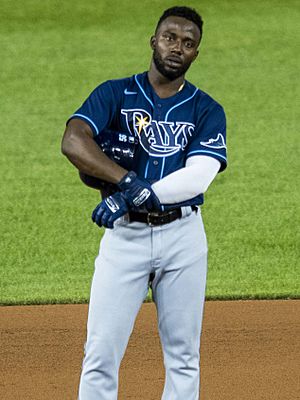
Despite trading many players, the Rays' pitching staff, led by Blake Snell, was excellent. Snell won the team's second Cy Young Award in 2018. The team also started using an "opener" strategy, where a pitcher starts the game for only an inning or two before another pitcher takes over. This new idea helped the Rays have one of the best pitching staffs in the league. They won 90 games in 2018 but did not make the playoffs.
Second AL Pennant (2019–2021)
Manager Kevin Cash led the Rays to the playoffs in 2019. They won 96 games, and their pitchers had the best ERA in the American League. They won the Wild Card game but lost to the Houston Astros in the ALDS.
The 2020 season was shortened to 60 games because of the COVID-19 pandemic. The Rays had the best record in the AL, winning 40 games and their division title.
In the 2020 playoffs, the Rays beat the Yankees in the ALDS. Randy Arozarena had an amazing postseason, setting new records for home runs (10) and hits (29) in a single postseason. The Rays then beat the Astros in the ALCS to reach the World Series again. In a thrilling Game 4, the Rays won in the last inning. However, they lost the next two games to the Dodgers and did not win the World Series.
In the offseason, the Rays traded away some key pitchers like Blake Snell. Despite this, the team had a great 2021 season, winning 100 games. This was the best record in the American League. They won their division for the second year in a row. They beat the Red Sox in Game 1 of the ALDS but then lost the next three games and were eliminated.
Recent Playoff Appearances (2022–Present)
The 2022 season was affected by many injuries. Even with strong pitching, the team finished third in their division. They still made the playoffs as a Wild Card team but lost to Cleveland. One game was a "historic pitcher's duel," going 14 innings without a run.
The 2023 season started very well, with the Rays winning their first thirteen games. Yandy Díaz won the team's first American League batting title. However, more injuries to pitchers and a tough July caused them to fall behind in the division. They made the playoffs again as a Wild Card team but lost to the Texas Rangers.
In 2024, the Rays traded away several players and missed the postseason for the first time since 2018. They finished with a losing record.
On June 18, 2025, the Rays confirmed they were talking about selling the team to a group led by Patrick Zalupski. On July 14, 2025, news broke that Patrick Zalupski would buy the team for about $1.7 billion.
Season Results
The table below shows the Rays' results for their last five seasons in Major League Baseball.
| American League champions * | Division champions ^ | Wild card berth ¤ |
| MLB Season |
Team Season |
League | Division | Regular Season | Post-season | Awards | ||||
|---|---|---|---|---|---|---|---|---|---|---|
| Finish | Wins | Losses | Win% | GB | ||||||
| 2020 | 2020 | AL * | East ^ | 1st | 40 | 20 | .667 | — | Won ALWC (Blue Jays) 2–0 Won ALDS (Yankees) 3–2 Won ALCS (Astros) 4–3 Lost World Series (Dodgers) 4–2 |
Kevin Cash (MOY) |
| 2021 | 2021 | AL | East ^ | 1st | 100 | 62 | .617 | — | Lost ALDS (Red Sox) 3–1 | Randy Arozarena (ROY) Kevin Cash (MOY) |
| 2022 | 2022 | AL | East | 3rd ¤ | 86 | 76 | .531 | 13 | Lost ALWC (Guardians) 2–0 | |
| 2023 | 2023 | AL | East | 2nd ¤ | 99 | 63 | .611 | 2 | Lost ALWC (Rangers) 2–0 | Yandy Díaz (Batting title) |
| 2024 | 2024 | AL | East | 4th | 80 | 82 | .494 | 14 | ||
These statistics are current through the 2024 Major League Baseball regular season.
Team Rivalries
AL East Rivals
The Rays' main rivals are the Boston Red Sox and the New York Yankees. Both teams play in the same division, the AL East.
Rays vs. Red Sox
The rivalry with the Red Sox started in 2000. There have been many heated moments and fights between the teams over the years. The rivalry became very strong in 2008, especially when the Rays beat the Red Sox in a seven-game series to win their first American League pennant.
Rays vs. Yankees
The Yankees and Rays play each other often because they are in the same division. There has always been some rivalry because the Yankees have their spring training home in Tampa. The rivalry became more intense in 2008 and again in 2020. In 2020, a Yankees pitcher threw a fastball over a Rays batter's head, leading to a bench-clearing incident. Later that year, the Rays beat the Yankees in the playoffs.
Citrus Series
The Rays also have a rivalry with the Miami Marlins, the other MLB team in Florida. This is called the "Citrus Series" because both teams are from Florida. The Rays currently lead this series.
Team Ballparks
Tropicana Field
The Rays played at Tropicana Field from 1998 until 2024. The stadium was built in the late 1980s to attract an MLB team. After the Rays were formed, the dome was updated and renamed Tropicana Field.
The stadium had more renovations in 2006 and 2007 to make it better for fans. A new playing surface was installed in 2007 and again in 2011.
In October 2024, Hurricane Milton caused a lot of damage to Tropicana Field's roof and flooded parts of the stadium.
George M. Steinbrenner Field
On November 14, 2024, the Rays announced they would play the entire 2025 regular season at George M. Steinbrenner Field in Tampa. This stadium is usually the spring training home for the New York Yankees.
George M. Steinbrenner Field was chosen because it was the best-prepared stadium in the Tampa Bay area to host regular MLB games. It was already being updated with better clubhouses and playing areas. It is also the largest spring training stadium in the region, holding about 11,000 fans.
Future Ballpark Plans
The Rays' owners have said that Tropicana Field did not make enough money and was not in the best location. The team's attendance has often been low compared to other MLB teams.
Since 2009, people have looked for new stadium locations in the Tampa Bay area. The city of St. Petersburg wanted the Rays to stay at Tropicana Field until their agreement ended in 2027.
In 2019, Major League Baseball allowed the team to explore playing some home games in Tampa Bay and some in Montreal. This plan would have meant playing spring training and the first two months of the season in Tampa, then moving to Montreal for the rest of the season. However, in January 2022, MLB said this split-season plan would not be allowed.
On September 19, 2023, the Rays announced plans to build a new stadium in St. Petersburg, next to Tropicana Field. This new stadium was planned to open for the 2028 season. It was expected to be a 30,000-seat stadium with a fixed roof, costing $1.3 billion. However, on March 13, 2025, the Rays announced they would not build this stadium.
Team Uniforms and Logos
Devil Rays Rainbow (1998–2000)
For their first three seasons, the Devil Rays wore white home and gray road uniforms. The team name "Devil Rays" (home) and "Tampa Bay" (road) were written in a unique "rainbow" style across the chest. They also had black alternate jerseys with the same rainbow text.
Rays Greens (2001–2007)
In 2001, the Devil Rays changed their look. They used more green and less purple. The font on their jerseys changed, and the home uniform simply said "Rays." In 2005, the home uniforms were updated again to include even more green.
Current Uniforms (2008–Present)
Since 2008, when the team became the "Rays," their main uniform has stayed mostly the same. The home jersey is white with "Rays" in dark blue across the chest and a yellow "sunburst" on the letter "R." The road uniform is gray with the same sunburst and team name. Both have dark blue trim and caps with a white "TB" logo.
The Rays also have alternate jerseys. One is dark blue with "Rays" and a yellow sunburst. Another is light blue. Since 2023, the team has also brought back the 1998 "Rainbow" Devil Rays uniforms for road games and special home games.
Special Uniforms
The Rays often have "Turn Back the Clock" nights where they wear old-style uniforms. Since 2009, they have worn the "rainbow" Devil Rays uniforms from their first season. Starting in 2023, these rainbow uniforms became part of their regular uniform rotation.
From 2012 to 2017, the Rays also wore "faux-back" uniforms. These were designed to look like what the team might have worn in the late 1970s and early 1980s.
In 2024, the Rays introduced their "City Connect" uniforms. These dark uniforms feature "Tampa Bay" across the chest in neon-outlined black letters. The cap has the Sunshine Skyway Bridge and a "skyray" (a stingray). Another logo on the uniform shows three palm trees and a pelican, which are symbols of the Tampa Bay area.
Team Culture and Fandom
Team Mascots
The Rays have two main mascots: Raymond and DJ Kitty.
Raymond was introduced in 1998. He is a "seadog" who interacts with fans and waves a "Rays Win" flag after home victories.
DJ Kitty was introduced in 2010. This large, cat-like character appears on the scoreboard with a DJ turntable to get fans excited. DJ Kitty also interacts with fans at the stadium.
More Cowbell
The Rays' "Cowbell" tradition started as a promotional idea from owner Stuart Sternberg. Fans ring cowbells loudly during home games, especially when the opposing team's batter has two strikes or when the Rays make a good play. Some opposing teams find the cowbells annoying.
Team Slogans
When Joe Maddon was the Rays' manager, he created several team slogans. For the 2008 season, the slogan was 9=8. Maddon explained this meant if nine players played hard for nine innings, the team would become one of the eight teams to make the playoffs. After they made the playoffs, the slogan changed to 9=4, then 9=2, and finally 9=1 for the World Series.
Another trend during Maddon's time was "rayhawks." Players and coaches would get mohawk haircuts. This started during their 2008 World Series run and continued for several years.
Images for kids
-
Carl Crawford was one of the Rays' first breakout stars.
See also
 In Spanish: Tampa Bay Rays para niños
In Spanish: Tampa Bay Rays para niños



